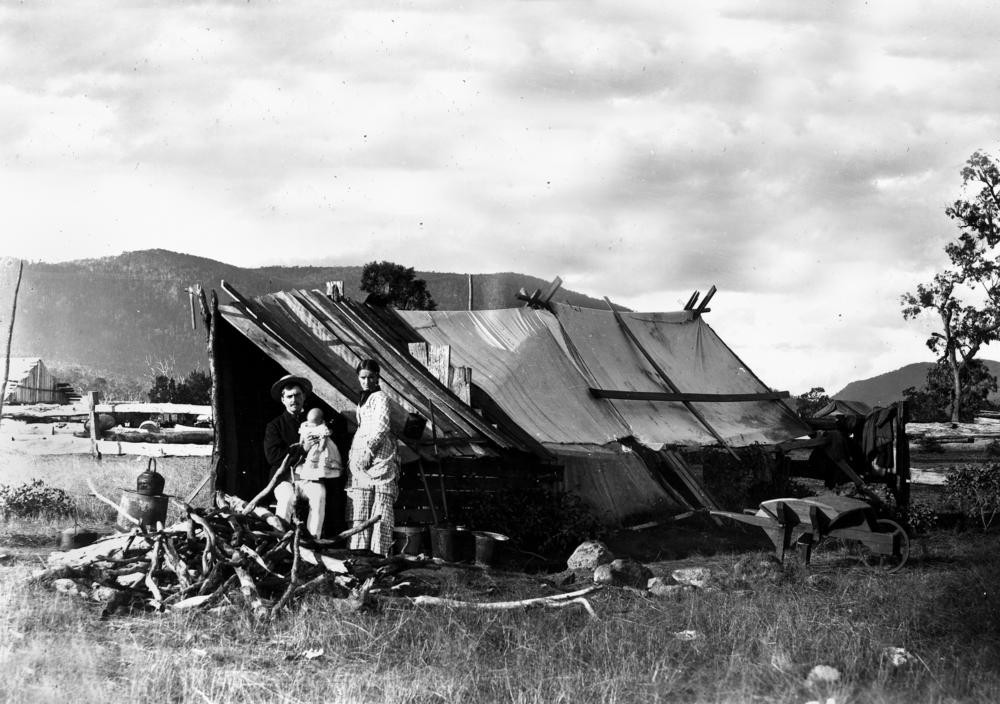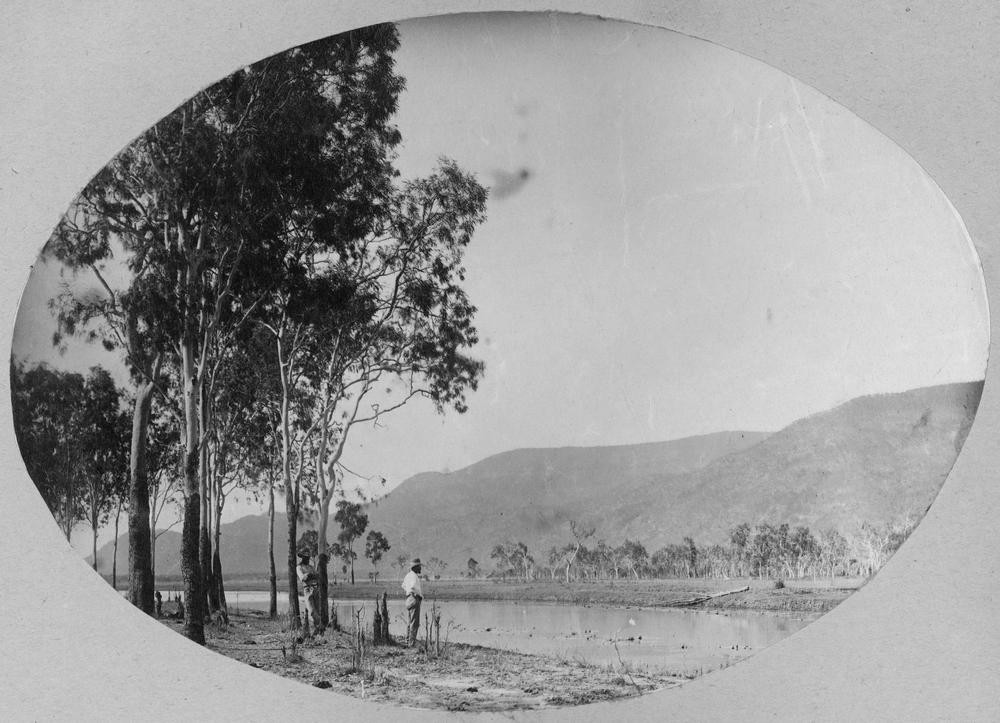Innocent victims : the harrowing introduction to Sarah Campion's 1941 novel 'Mo Burdekin'
By Simon Miller, Library Technician, State Library of Queensland | 31 May 2012
In this series of extracts from Queensland fiction dealing with floods, coinciding with our Floodlines exhibition, we now move away from Brisbane and visit the Burdekin River in North Queensland.
Sarah Campion ( born Mary Rose Coulton, 1906-2002) was an English novelist who spent six months in 1939 on the Atherton Tableland. This visit to Queensland inspired a trilogy of Queensland novels, Mo Burdekin (1941), Bonanza (1942) and The Pommy Cow (1944) and three other novels set in Australia. She was keen to return to Australia in the 1940's but was not able to do so and eventually settled in New Zealand in 1952.
Mo Burdekin is a story of pioneers on the Burdekin River in the 1880's. It is the story of an orphan who comes floating on flood waters to be found by Reuben, a store keeper, who raises him and naturally names him Moses. The prologue of the novel describes the dire predicament of a group of children forced to flee the rising flood waters on their own and the tragic fate that befalls all but the youngest.


On the second day of the flood when the river was no longer a meandering landmark but a stretch of dirty water paddocks wide and still rising, the Irishman fossicking in the abandoned workings of the Old Glory struck camp. His family had gone hours before, knowing their parent too well to wait on his sense of caution. Gathering together a meager heap of household goods, they had pattered sturdily off, across the narrow arm of the creek that still had a blue gum laid across it for bridge, off and away and up into the streaming bush. The rain had ceased for a few hours, though the sky was still heavy with it: there was time before the next storm to cross the far river to Red Pinch and shelter. So they went on, silent. Remembering that she had left her only needle sticking in the canvas of the tent-flap, that her mother lay dead on the stretcher beside it, that the baby was not a year old, Janey the eldest groaned in spirit, squared her narrow shoulders, and urged the little troupe upwards with a flood of oaths violent even for her. Pa couldn’t be trusted to see to anything, not even the burying: seeing him, as they had left him, staggering drunkenly about the disused workings and picking feebly first at this heap of tailings, then at that, her shrewd soul despised him. But she would not go back to see that a body got its last rites: she drove her living flock relentlessly on, cursing them, cursing the weight of the sagging baby. ...
The children have climbed over the first ridge and unwisely stop for a rest in tall grass near a second creek, before Janey tries to find a way across.
She rose, twitched her dirty sugar-bag garment, yawned, stretched, kicked at a darting lizard, and stared upstream. Stared in horror, gaped wider still. For there was a new roar above the voice of the Burdekin: now there was no getting across this creek nor any other, now it was too late. Now, swollen with the waters of a dozen rushing creeks, the new dam by Jabiru has burst its banks, the water comes roaring out in a solid curve to overwhelm the flimsy humpies of the workman’s camp below it, sucking up a dozen gaping workmen in its first breath, taking them in as a tit-bit before pounding down the swollen creek, pounding, smashing, roaring downwards, onwards through Jabiru, lifting the bridge like a snapped match, engulfing thirty head of prize cattle in the yard by the depot, going on remorseless, its appetite merely whetted, down the valley past the tin-workings. …
The wave had parted roaring at the junction of the creeks and raced down both, blood-red with the tin-rich soil, foaming, spuming, tossing, thundering, with a wild lacy pattern of uprooted pandanus palms, sword grass, bottle-brush bushes and all the arboreal jetsam of any Queensland creek over its romping surface. On, on, to the children crouching like young quail in the deep grass, and gaping Janey looking for a way to cross. She saw first a dark casuarina cast sportively ten foot above the grass then dropping like a shot bird back into the flood: she saw the tree, she heard the roar, she saw the red tide of the wave heave up against the rainy sky, she leapt to the children, she caught her foot in the bright grass, she fell with her temple cracking against the cradle’s edge, and lay senseless with a punctured skull.
Janey was quickly dead, the children were less lucky. Had they raced for the bush instead of staring at their dropped elder lying bleeding beside the cradle they might have been saved, for they were not in the line of wave but in a little hooked-out backwater up which the tide seeped more slowly. But leaderless, disorganized, frantic, they fell to crying and screaming, ran hither and yon in the thick grass as the wave went by, tripped in the lush, green, glorious grass, struggled up bemused and made off with one accord, like stampeding sheep, towards the rising tide. Up came the water in the wake of that towering wave: now their dusty little feet were ankle-deep, now their dirty little knees, scored and scratched by a hundred encounters with their mother the Bush, were wet and slimy with the flood: now, wrapping tepid and horrible round the waists, the armpits, the shoulders of these bush babies, the flood surged up. The smallest sister was first engulfed, tripped among the rampant grasses, gasping her little lungs full of flood-water as she dropped. Fiercely over her the water rose, one by one the cries died, the bobbing heads sank, soon even the grass had gone. Now there was nothing in the whole wide river but tossing water, uprooted trees, a few bandicoots and kangaroo rats feebly struggling still, and an old wooden cradle carved with grapes and acanthus leaves in which a dirty brown baby sat drooling with bubbles at his mouth, snatching at the twigs and floating grass-heads as he floated onwards, southwards, on the broad tossing breast of the Burdekin.
Other articles exploring literary responses to past floods in Queensland -
Visions of decay: the 1974 Brisbane flood in Manfred Jurgensen’s novel ‘The eyes of the tiger’
Bett : a tale of old Breakfast Creek by Mary Guthrie
Reluctant rescue : an extract from Flood Children by Thomas Shapcott
Also don't forgot our Queensland literature talk - On Our Selection and beyond: Queensland's literary heritage in July!
Simon Miller - Library Technician, State Library of Queensland
Comments
Your email address will not be published.
We welcome relevant, respectful comments.